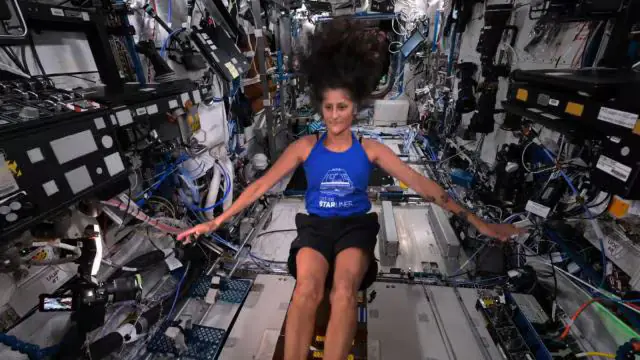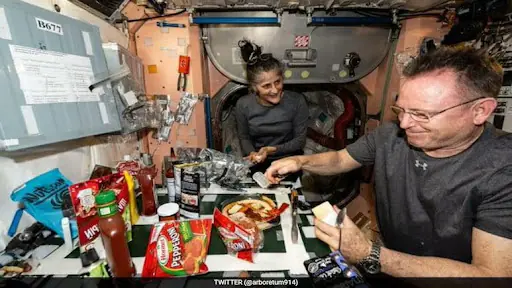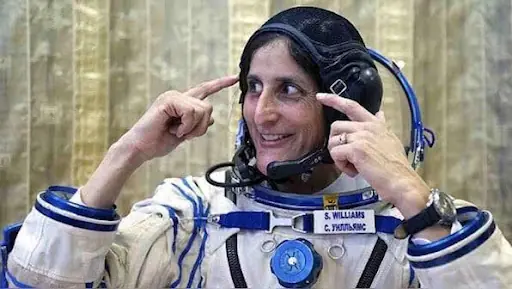The vast expanse beyond Earth’s atmosphere is a place of unique beauty and unparalleled scientific potential, yet it is also fraught with significant challenges for human survival. In the microgravity environment of space, the body undergoes profound changes. Muscles weaken, and bones lose density—a condition referred to as spaceflight osteopenia—due to the absence of gravity’s constant pull.
Additionally, bodily fluids shift upward, leading to puffiness in the face and increased cranial pressure, which can result in vision issues. Even basic tasks such as eating, sleeping, and maintaining hygiene require innovative approaches to adapt to the weightless environment. Beyond the physical challenges, astronauts must also cope with psychological stresses like isolation and confinement, which demand immense mental strength and adaptability.
International Space Station (ISS) orbits around the Earth as a symbol of collaboration of countries and space agencies. It is the home for Astronauts from various nations, and serves as a microgravity lab where science and innovation transcends earthly boundaries. At Space India, Through, the Space Explorers Workshop, “International Space Station”, students learn about the ISS and comprehend the distinctions between daily activities on Earth and in space by observing visual depictions of astronauts’ routines, including tasks like brushing their teeth and standing, while aboard the ISS. Students in team tasks, create a model of the International Space Station too.

Sunita Williams, a highly experienced astronaut, serves as a remarkable example of how humans can overcome these challenges and thrive in space. She emphasizes the critical importance of maintaining physical fitness to counteract the effects of prolonged weightlessness. Williams adheres to a carefully structured exercise routine that includes the use of specialized equipment such as a treadmill with harnesses, a stationary bicycle, and the Advanced Resistive Exercise Device (ARED). These tools are specifically designed to mimic the effects of gravity, enabling astronauts to maintain muscle strength and bone density during their missions. Through her disciplined fitness regimen, Williams remains healthy and robust, inspiring others to recognize the value of fitness and resilience in extreme environments.
In addition to exercise, Williams highlighted the importance of a well-balanced diet while in space. Nutritional planning on the ISS is meticulously crafted to meet the unique demands of astronauts, providing calorie-controlled meals rich in essential vitamins and minerals. These meals are carefully designed to support physical performance and overall health, countering the physiological stressors of space travel. Williams also pointed out that any perceived changes in her appearance were not due to actual weight loss but rather to fluid redistribution caused by microgravity. This phenomenon can create a slimmer facial appearance, leading to misconceptions about significant weight changes.

To further ensure their health, astronauts undergo regular medical evaluations on the ISS. Williams explained that her health was closely monitored throughout her mission, with Earth-based medical teams tracking her vital signs and overall well-being. These routine checkups help identify and address any potential issues, ensuring that astronauts remain in optimal condition. Williams credited these advanced health protocols with enabling her to perform the physically demanding tasks required of her during the mission, while also dispelling myths about the dangers of living in space.
By addressing these rumours, Williams not only reassured the public about her well-being but also shed light on the incredible advancements in astronaut health and fitness programs. Her transparency underscores the resilience of the human body and the effectiveness of disciplined health practices in overcoming the challenges posed by spaceflight. Her experience serves as a testament to the meticulous preparation and innovative technology employed by space agencies to ensure the safety and performance of astronauts.

Sunita Williams’ journey on the ISS highlights the importance of adaptability, discipline, and the role of cutting-edge science in enabling humans to thrive in space. Her ability to maintain her health and debunk misconceptions about weight loss or physical decline demonstrates the potential of humans to not only survive but also excel in the extraordinary environment of space. By sharing her experiences, Williams inspires confidence in human space exploration, paving the way for future missions and proving that the challenges of living beyond Earth can be met with determination and innovation.
—
If you like the blog, enrol your school or yourself (k-12 student) in our School Programs or Online Programs, call us at +91-74020 74020 or write to us for any query: getintouch@space-india.com

